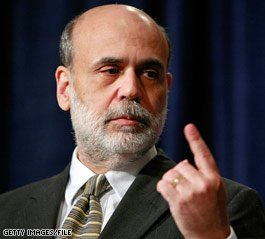LIVE: Yahoo's Third Quarter Earnings Not As Bad As Feared, But Layoffs Set to Begin
Not surprisingly, Yahoo just reported third-quarter earnings that were weak but not as awful as some might have expected. However, the company said layoffs of at least 10% of the staff of 14,300 will begin in the fourth quarter—about what reports had anticipated.
They will be part, but not all, of a sweeping cost-cutting effort that is intended to reduce its annual costs of $3.9 billion by about $400 million before the end of this year. “Now we are conducting a deep review of our cost structure to identify more opportunities to enhance efficiency and build a stronger and more profitable Yahoo!,” president Sue Decker said in a statement.
Net profit fell 64% to $54.3 million, or 4 cents a share, from $151.3 million, or 11 cents a share, a year ago. Excluding special items such as stock option expenses, profit fell from 11 cents a year ago to 9 cents a share in the third quarter, precisely what analysts were expecting. However, net revenues, after payments to partners for traffic, rose just 3%, to $1.33 billion, slightly short of the $1.37 billion analysts had forecast.
Yahoo lowered its 2008 revenue outlook to between $7.18 billion and $7.38 billion, from its previous forecast of $7.35 billion to $7.85 billion.
Yahoo Chief Financial Office Blake Jorgensen cited “an increasingly challenging economic climate and softening advertising demand” for Yahoo’s results coming in at the low end of the range it had forecast. Although he said in a statement that Yahoo was “disappointed” in the results, he said cost-cutting during the year so far had helped cushion the economy’s impact on operating cash flow. Free cash flow, after capital expenses, fell 31%, to $151 million, from a year ago.
You can view the results and then listen to the conference call online here. After the jump is my pre-earnings analysis of the many issues facing Yahoo as it reports results and provides an outlook on coming quarters:
UPDATE: Investors so far seem relatively pleased, with the stock up 5% after-hours.
And the call begins with Jerry Yang. He says Yahoo saw “mixed trends,” with search and performance-oriented display ads showing strong growth but “demand for branded display advertising weakened.” So the company is reducing full-year revenue outlook but keeping its operating cash flow outlook thanks to cost cuts, which will be not only layoffs but cuts in real estate, standardization of its technology platform, and other methods.
He says he remains optimistic about Yahoo’s future because the downturn likely will drive advertisers to reliable venues. The latter, at least, is what I’ve been hearing from advertisers and agencies, but the question will be to what extent Yahoo’s entire ad offering will be the most compelling.
“This is in many ways an unprecedented operating environment,” Yang says. “We believe the online ad market will emerge strong, with Yahoo well-positioned to take share.”
Now President Sue Decker comes on to talk about fairly familiar Yahoo products and features, though one detail—page views up 17%—is a positive sign. But she says overall monetization of pages was lower than expected, especially commitments to branded campaigns. Despite strength in search revenues from its own sites, up 17%, display ad revenues on its own sites was up only 3%, much less than double-digit gains in previous quarters.
Decker’s now talking up APT, its new display-ad platform.
Now it’s on to Jorgensen: Two main themes in quarter, already apparent in previous comments: worsening economic environment coupled with greater cost cuts. “We are cautious about the advertising market in Q4. But we feel we are well-positioned to weather the downturn.” Mentions the Asian properties are valued at $7 billion or so, or more than $5 a share—a clear attempt to point out that Yahoo’s stock is undervalued in his view.
Now, the analysts’ questions:
* How is Yahoo going to improve monetization on its own sites? Decker says mainly the display ad platform, APT.
* Any lift in ad rates thanks to APT? Decker says no data yet.
* Where were the cost cuts in the quarter? Jorgensen: All year, actually. Slower hiring, but mainly hiring in lower-cost areas like India, Eastern Europe, and Southeast Asia.
* Any deadline on the Google-Yahoo deal? Yang can’t say, though I’ve gathered from people close to this that the Oct. 22 deadline mentioned widely isn’t actually a deadline. Talking with the Justice Department and others.
* How confident are you in the revenue forecast? Decker: watching weakness in Asia, but she mentions some “stability” in the U.S. despite some ad cancellations in travel and other areas.
* Could there be more consolidation among companies online, and what would Yahoo’s role be? Yang: Says there are opportunities, especially since ad spending isn’t increasing much, so it’s hard to grow that way. But he offers no specifics.
* How do you see your growth rate vs. Google? Yang: “There continues to be a flight to quality with regard to consumer behavior and advertiser behavior.” Decker more specifically acknowledges the obvious, that Google’s growth rate is faster than Yahoo’s, and talks about various ways Yahoo hopes to improve its search offerings for consumers and its search ad system for advertisers.
* Was there a sharp downturn in September? Decker: “The trends weakened in the latter part of August.” First Europe, then Asia. Also weakened in the U.S. but not as much as the rest of the world.
* What’s the ‘09 outlook? Yang, with a hint of a rueful laugh: “I don’t think we have any visibility into ‘09.”
* What’s the impact of acquisitions on revenue? Jorgensen says acquisitions contributed 1% to GAAP revenue.
* In what departments or functions is Yahoo making cuts? Yang doesn’t provide specifics, just the usual things like real estate.
* How will Yahoo unlock shareholder value? Yang says one way is cutting costs. Conservative on share buybacks, though, so that looks unlikely.
* How much of the weak 3% display-ad growth is due to the economy and how much to losing share to ad networks and niche sites? Decker: Can’t really say yet, but says Yahoo is outgrowing the ad networks.
* How sensitive will Yahoo be to diluting shareholders if and when it does acquisitions? Jorgensen: “We’ll clearly be very sensitive to dilution.”
* Last question: Have you considered hedging out exchange risks in various international markets? Jorgensen: Yes, but doesn’t sound like Yahoo plans to do much on that.
And that’s it for the call. The stock’s now up about 7% in extended trading, so if anything, the details from the call reassured investors—at least to the mild extent that they can be reassured about a company facing this many challenges.
Analysts are expecting a profit of 9 cents a share on net revenues, after payments to partners for traffic, of $1.37 billion. But some analysts, who have already cut their estimates for the fourth quarter and next year, think Yahoo could miss those numbers. Yahoo’s stock closed down about 6%, to just over $12 a share, in trading Oct. 21 before the earnings announcement.
Investors also will be looking to see if Yahoo announces layoffs, as recent reports have indicated it might, and how many. Several reports indicated it could cut about 1,500 people out of its staff of 14,300, though it wasn’t clear when and where the cuts would be made inside the company. Yahoo has hired consultant Bain & Co. to help suggest various cost-cutting measures, which could go beyond layoffs.
Like Google’s earnings last week, Yahoo’s will be closely watched for signs of how badly online advertising will be hit by the deepening economic downturn. Google, however, which reported better-than-expected results, was not a good industry bellwether because of its dominance in relatively well-performing search ads.
By contrast, Yahoo is more representative of the broader online advertising market, in particular display ads that are likely to bear the brunt of cutbacks by large brand advertisers. In particular, Yahoo’s heavy reliance on financial services and automobile advertising could hurt it as the effects of the credit crunch worsen. “Their business has been hurting,” says John Aiken of Majestic Research. “The real miss looks like it’s coming on the branded display ads.”
And those cutbacks were already starting even before the market meltdown began about a month ago. According to recently released figures from the Interactive Advertising Bureau and PricewaterhouseCoopers, display advertising declined from the fourth quarter of 2007 to the first quarter of 2008, and also fell again slightly from the first to the second quarter. That hasn’t happened since 2002. “If clients have to cut, digital budgets are not going to escape scrutiny,” says Clark Kokich, CEO of Razorfish, an online ad agency owned by Microsoft. “You’re going to see a softness we haven’t seen for the last few years.”
At the same time, Yahoo faces many other challenges. Since Microsoft walked away from offers to buy the entire company and then only its search business, Yahoo’s stock has fallen—especially after the market meltdown. It’s now trading a little under $13 a share, a small fraction of Microsoft’s original $31-a-share offer. And while Microsoft CEO Steve Ballmer recently appeared to hint that the company is still interested in Yahoo, Microsoft officially quashed that notion.
Yahoo has been discussing a combination with AOL, which parent Time Warner has been shopping for months. The agreement is believed to involve Yahoo taking over AOL for something under $10 billion and Time Warner taking a minority stake in Yahoo. According to people familiar with the companies, Yahoo, bolstered on the media front with AOL, might then be willing to do a search deal with Microsoft from a position of more strength.
However, it’s not clear that such a combination would help Yahoo regain ground lost to fast-growing social networking sites such as Facebook and News Corp.’s MySpace, let alone Google. Despite a monthly audience of 500 million people worldwide, Yahoo has been unable to break into social networking, a key potential growth area.
That’s not all the drama surrounding Yahoo. Its proposed deal to run Google search ads on some of its pages is under intense scrutiny by the Justice Department, which is expected to make a decision soon. Although few people expect the deal to be opposed outright, many legal observers think limits could be placed that would make the deal—which Yahoo said could contribute $250 million to $450 million in cash flow annually—less lucrative.
Not least, Yahoo’s plight also has been sending a steady stream of talent out the door, from engineers to executives. And the layoffs being considered now no doubt would hurt morale even further. That’s especially likely if Yahoo doesn’t announce specific jobs to be cut until later in the year.
The only upside for Yahoo is that its difficulties could be priced into the stock already, leaving relatively little downside. However, few people expected Yahoo’s stock to fall this far. So for now, all bets are off.















